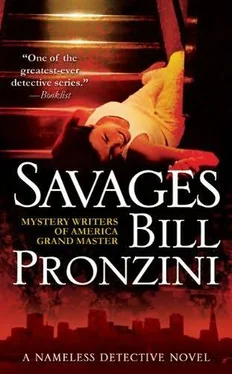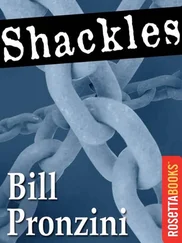Bill Pronzini - Savages
Здесь есть возможность читать онлайн «Bill Pronzini - Savages» весь текст электронной книги совершенно бесплатно (целиком полную версию без сокращений). В некоторых случаях можно слушать аудио, скачать через торрент в формате fb2 и присутствует краткое содержание. Жанр: Криминальный детектив, на английском языке. Описание произведения, (предисловие) а так же отзывы посетителей доступны на портале библиотеки ЛибКат.
- Название:Savages
- Автор:
- Жанр:
- Год:неизвестен
- ISBN:нет данных
- Рейтинг книги:4 / 5. Голосов: 1
-
Избранное:Добавить в избранное
- Отзывы:
-
Ваша оценка:
- 80
- 1
- 2
- 3
- 4
- 5
Savages: краткое содержание, описание и аннотация
Предлагаем к чтению аннотацию, описание, краткое содержание или предисловие (зависит от того, что написал сам автор книги «Savages»). Если вы не нашли необходимую информацию о книге — напишите в комментариях, мы постараемся отыскать её.
Savages — читать онлайн бесплатно полную книгу (весь текст) целиком
Ниже представлен текст книги, разбитый по страницам. Система сохранения места последней прочитанной страницы, позволяет с удобством читать онлайн бесплатно книгу «Savages», без необходимости каждый раз заново искать на чём Вы остановились. Поставьте закладку, и сможете в любой момент перейти на страницу, на которой закончили чтение.
Интервал:
Закладка:
“Why don’t we both go? Emily, too. We haven’t been to an art gallery in quite a while.”
“All right with me, if you’re sure that’s how you want to spend a Sunday afternoon.”
“What I want,” she said, “and what I need, is to start doing the things I enjoy, feeling normal again.”
Amen to that.
The Brookline Gallery, Purveyors of Fine Art, was on Post Street, off Union Square. Fronting the sidewalk was a broad bay window, inside of which a single large oil painting was displayed on an easel. In the
window itself, a placard lettered in gilt-edged black: PRESENTING THE IMPRESSIONIST VISIONS OF T. R. QUENTIN.
“That’s one of her visions in the window,” Kerry said.
I looked at it before we went inside. Riotous swirls and whorls and globs and blobs of rainbow colors-yellow, red, blue, purple dominating-intermingled with solid black geometric designs of varying sizes. A gold plaque on the base of the frame gave its title as Searches. It didn’t do much for me; if I looked at it too long and in the wrong frame of mind I’d probably want to retitle it Searches and Seizures.
Emily said, “I like it. Don’t you, Mom?”
“Yes, it’s interesting.”
“Dad?”
“Personally I prefer pulp covers.”
Kerry said, “Lowbrow,” and we went on inside.
The Brookline’s interior was set up along the lines of a museum. One large room, two smaller ones, lots of open space, long walls and short ells built in and created by movable partitions, benches for restful viewing of the artworks on display. There must have been more than fifty paintings of varying sizes-acrylic, oil, watercolor-plus a handful of tapestries. At the entrance to one of the smaller rooms, a duplicate of the window placard was propped on an easel to let you know that that was where the Quentin pieces were exhibited. Kerry and I went in there. Something else caught Emily’s eye and she went scooting off by herself to check it out. In some ways she was your typical eleven-year-old; in others she was a full-fledged adult. Most kids would have balked at a Sunday afternoon visit to an art galley. Emily relished it.
The Quentin room was occupied by two women, one elderly and overly dressed, the other younger and fashionably attired. Customer and gallery employee, from the snatches of conversation I overheard. Kerry and I took a look at the dozen or so paintings in there. All were similar to the one in the front window, some with broader, sweeping brushstrokes, others done in colors that were more or less bright. Each had varying numbers of solid black squares, rectangles, oblongs, triangles, trapezoids. On the bottom corners of their frames small, discreetly placed price tags said that they could be had for from $750 for the smallest to $5,000 for the largest. Kerry didn’t think the prices were out of line, given the value placed on quality contemporary art these days. Nice money if you could get it. Or if you had it to spend.
“Kandinsky,” she said.
“How’s that?”
“Her major influence. Wassily Kandinsky, one of the Blue Riders.”
“If you say so.”
“The Blue Riders were a group of artists in Munich in the early twentieth century. Specializing in nonobjective, free-form abstracts.”
I nodded and said, “Uh-huh,” and the two women finished their conversation and the younger one came over to where we were.
“Aren’t these wonderful?” she said, smiling. “Ms. Quentin is such a talented artist. We feel privileged to have her exhibiting with us.”
“Wonderful,” I agreed. “Very colorful. Would Ms. Quentin happen to be here today, by any chance?”
“As a matter of fact, she is. In the office with a customer at the moment. Would you like a word with her?”
“Whenever it’s convenient.”
“Please wait. She should be available shortly.”
We waited about five minutes. The woman who came bustling in alone was on the backside of forty, all smiles and rouged cheeks, wearing an outfit as multihued as her paintings; slim and trim and poised in her movements, projecting an air of cheerful self-confidence. The only jarring note was dark red hair combed or uncombed, take your pick, in spiky juts and tangles. Kerry told me later that the haircut was fashionable among young people, both men and women, these days. My response to that was, “Why?”
We introduced ourselves. Were Kerry and I prospective buyers? No, we weren’t. That put a crimp in her smile, and when I told her I was employed by Nancy Mathias’s sister, it morphed all the way into a sad downturn. She didn’t ask what I did for Celeste Ogden and I didn’t volunteer the information. She said, “I was so sorry to read about Mrs. Mathias’s death. A terrible tragedy.”
Mrs. Mathias, not Nancy. “You didn’t know her well?”
“No, hardly at all. I wish I had.”
“I understand she bought some of your paintings shortly before her accident.”
“Actually, no, she didn’t.”
“But she did pay you a large sum of money. Ten thousand dollars.”
“ ‘Pay’ isn’t the right word. It was a gift, you see.”
“Oh? Pretty substantial gift.”
T. R. Quentin’s eyes brightened; the smile threatened to reestablish itself. “It absolutely floored me. It was like… I don’t know, winning a lottery prize. Manna from heaven.”
“How did it come about?”
“She called me one day at my studio. Out of the blue. Said she was a great admirer of my work and if we could meet, I’d find it well worth my time. Naturally I thought she intended to buy one of my paintings. So I invited her to come to the studio.”
“You’d never had any contact with her before?”
“None. She was a complete stranger.”
“Did she take you up on the invitation?”
“The following afternoon. She didn’t stay long, not more than twenty minutes. She had another appointment in the city, she said.”
“She happen to mention who the appointment was with?”
“No, she didn’t.”
“And she only stayed twenty minutes?”
“About that. We had coffee; she looked at my finished work; she asked a few discreet questions about my financial situation and my future goals. And then she wrote out that check. Well, I nearly fainted when I saw the amount. Every struggling artist dreams of a patron like Mrs. Mathias, but to have one actually appear, all of a sudden like that… well, I’m still in the pinch-me stage.”
“Did you ask her why she was giving you such a large amount?”
“Of course. She said it was the least she could do to help an artist who was going to be famous someday.” Color came into the woman’s cheeks, all but making the spots of rouge disappear, but it wasn’t the modest or humble type of blush. Nancy Mathias was not the only one who believed the “famous” prediction. “I offered to let her take any of my finished paintings she liked, more than one, but she refused. She simply shook my hand and wished me good fortune and walked out of my life as suddenly as she came into it.”
“Why did she refuse the offer, if she liked your work so much?”
“I don’t know. All she said was that she wouldn’t be able to enjoy the paintings.”
“Those her exact words?”
“I think it was something like, ‘I won’t be able to enjoy them where I’m going. Let others have the pleasure and the rewards.’ ”
“She didn’t indicate where it was she’d be going?”
“No, she didn’t. I thought it might be that she was planning to move to another state or another country-you know, change and downsize her life. But that’s just my impression.”
“How did she seem to you that day?”
“Seem? I’m not sure what you mean.”
“Her demeanor, her state of mind. Was she happy, sad?”
Читать дальшеИнтервал:
Закладка:
Похожие книги на «Savages»
Представляем Вашему вниманию похожие книги на «Savages» списком для выбора. Мы отобрали схожую по названию и смыслу литературу в надежде предоставить читателям больше вариантов отыскать новые, интересные, ещё непрочитанные произведения.
Обсуждение, отзывы о книге «Savages» и просто собственные мнения читателей. Оставьте ваши комментарии, напишите, что Вы думаете о произведении, его смысле или главных героях. Укажите что конкретно понравилось, а что нет, и почему Вы так считаете.












